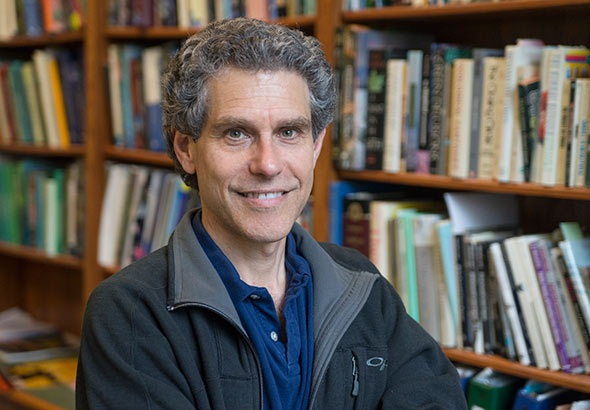
Menu
- About
- Consultation
- Programs
- Resources
- News & Events
Back to Top Nav
Back to Top Nav
Back to Top Nav
The College has selected five faculty members to lead Dartmouth into the world of open online courses through the edX platform.
The first course—an introduction to environmental science that is scheduled to launch in early 2015—will be taught by Professor Andrew Friedland, who holds the Richard and Jane Pearl Professorship in Environmental Studies.

"I know the experience will greatly enhance the introductory environmental science course I teach each year to Dartmouth undergraduates," says Andrew Friedland, the Richard and Jane Pearl Professor in Environmental Studies. (Photo by Eli Burakian ’00 )
Courses to come include engineering of structural forms, taught by Associate Engineering Professor Vicki May; an introduction to opera, taught by Professor Steve Swayne, chair of the music department; and a course in 19th century American literature taught by Professor Don Pease, the Ted and Helen Geisel Third Century Professor in the Humanities, and James "Jed" Dobson, a lecturer in writing.
“EdX offers an exciting opportunity to share the unparalleled teaching of Dartmouth faculty, like professors Andrew Friedland, Vicki May, Steve Swayne, Don Pease and Jed Dobson, with a wider audience," Interim Vice Provost Lindsay Whaley says.
Read more:
"At the same time, these pioneers will bring the insights they gain from the experience to prompt our own thinking about how best to integrate new educational technologies with Dartmouth’s unwavering mission to provide a first-rate liberal arts education,” says Whaley, who is leading the College's edX integration in the program dubbed DartmouthX.
Friedland calls his selection as the first Dartmouth professor to develop and teach a Dartmouth course through edX “an honor.”
"I know the experience will greatly enhance the introductory environmental science course I teach each year to Dartmouth undergraduates," Friedland says. "I hope to offer an exciting and informative online course on energy and pollution that will be beneficial to a large, diverse group of people from around the country and around the world."
Josh Kim, Dartmouth’s director of digital learning programs, says there was broad interest among the faculty and a large number of professors put together proposals for DartmouthX courses, which involve tailoring classes to fit the interactive, digital, online platform.
"There was a tremendous amount of excitement among the faculty about using this experience to help them reimagine their existing residential Dartmouth classes," Kim says. "All the proposals were amazing. These are just the first four we will launch. This is an experiment, but we are committed to doing this over the years to come."
Starting with Friedland, professors will work closely with a DartmouthX team that includes an instructional designer to help translate faculty's teaching objectives onto digital platforms, a project manager to coordinate all the moving parts, a media specialist, and a librarian, Kim says.
DartmouthX will also draw on expertise from the Dartmouth Center for the Advancement of Learning (DCAL) for course design, institutional research, and help with analytics, Kim says.
Professors will engage with the edX course during the initial run time, generally six weeks, and then the course will operate independently on the site. The DartmouthX classes will be free and open to anyone, and will not be part of the Dartmouth curriculum.
"I always say they will be Dartmouth courses, but not a Dartmouth education. There is no way to bring a Dartmouth education to scale. It is built on relationships," Kim says.
Another important aspect of the DartmouthX project, Kim says, is what professors will bring back to the College. Materials and expertise gained from the edX experience will be brought back onto the College's internal online platform, known as Canvas, and will be available to professors to adapt for Dartmouth course work, Kim says.
"EdX is part of larger digital learning initiative, which includes our gateway course initiative," he says. The College is looking to develop these new teaching methods and new technology to enhance the Dartmouth education.
"We are trying to be deliberate, trying to learn as much as we can. So as DartmouthX is developed, we continue to think about how we can bring this back to our students."